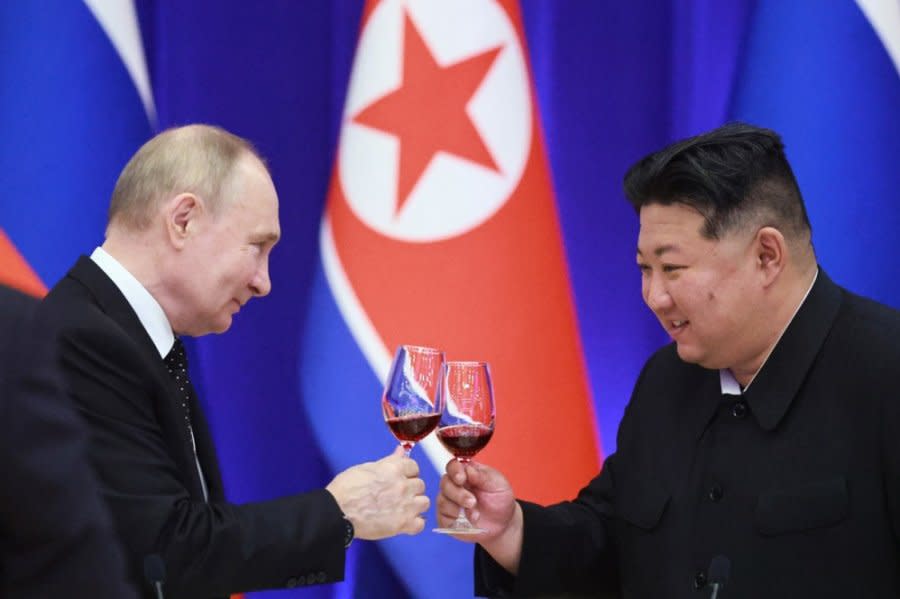North Korea-Russia treaty calls for mutual military aid 'without delay' in event of war

- Oops!Something went wrong.Please try again later.
- Oops!Something went wrong.Please try again later.
SEOUL, June 20 (UPI) -- A treaty signed by Russian President Vladimir Putin and North Korean leader Kim Jong Un during their summit in Pyongyang called for extending military aid "without delay" if either country is attacked, according to the full text published by the North's state-run media Thursday.
"In the event that either party is in a state of war as a result of armed aggression by individual or multiple states, the other side shall provide military and other assistance without delay by all means at its disposal in accordance with Article 51 of the U.N. Charter," the agreement, published by Korean Central News Agency, said.
The U.N. Charter's Article 51 stipulates "the inherent right of individual or collective self-defense if an armed attack occurs against a Member of the United Nations."
The two leaders signed the treaty on Wednesday night during a brief visit by Putin, his first to North Korea in 24 years. The pact revives a 1961 mutual defense clause between the Cold War allies that expired when the Soviet Union dissolved in 1991.
The new treaty also promised "the expansion and development of cooperation in the fields of trade, economy, investment, and science and technology."
Following the summit, Kim said the declaration represented a "watershed in the history of Russian-Korean relations."
"Relations between our countries have risen to a new high level of alliance," he said at a press conference at Kumsusan Palace of the Sun in Pyongyang, according to a transcript by the Kremlin.
Putin stopped short of defining the partnership as an alliance but said that Russia "does not rule out developing military and technical cooperation with the Democratic People's Republic of Korea under the document signed today."
In his remarks, Putin also highlighted efforts to boost economic ties outside the reach of the international sanctions imposed on both countries.
"We will also keep opposing the very practice of cutthroat sanctions as a tool that the West [applies] for preserving its hegemony in politics, the economy and many other areas," he said.
Putin's visit followed a trip by Kim to Russia in September, which launched a new era of cooperation between the Cold War allies centered around Pyongyang's shipment of munitions to Moscow for its war in Ukraine.
Earlier this week, U.S. State Department spokesman Matt Miller said that North Korea has transferred "dozens of ballistic missiles and over 11,000 containers of munitions to aid Russia's war effort."
Washington and its allies claim that Russia is providing fuel, raw materials and advanced space and weapons technology to North Korea in exchange.
South Korea's Foreign Ministry on Thursday condemned the growing relationship between the isolated regimes.
"We express our regret that, despite repeated warnings from the international community, Russia and North Korea have signed a comprehensive strategic partnership treaty and openly mentioned military-technological cooperation, which directly violates U.N. Security Council resolutions," ministry spokesperson Lim Soo-suk said at a press briefing.
South Korea "will work with the international community, including our allies and friends, to respond to any act that threatens our security in a correspondingly stern and resolute manner," Lim said.
After a state reception in Pyongyang, Putin flew to Vietnam late Wednesday for a two-day visit to the Communist state -- a longtime ally that has grown closer to Washington in recent years.
On Thursday, the Russian leader met with Communist Party General Secretary Nguyen Phu Trong and new President To Lam and signed a series of strategic partnership agreements.

